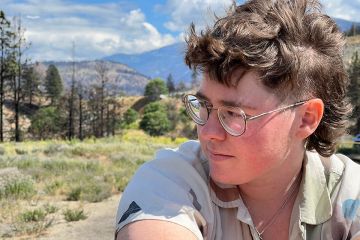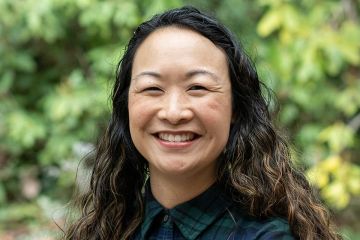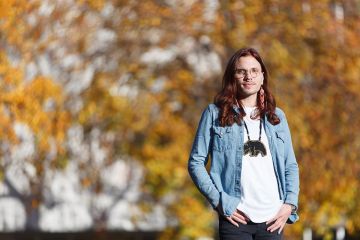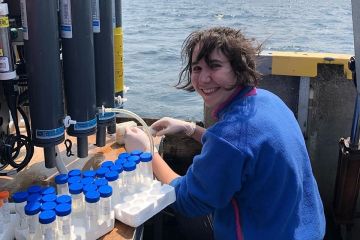Waves of change
- Anne MacLaurin
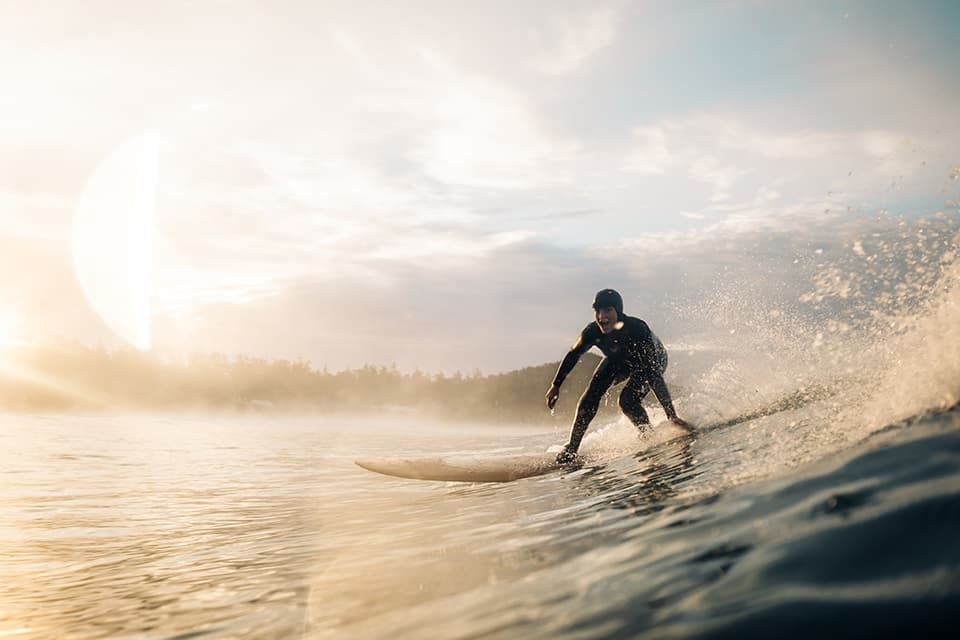
A coastal dweller, surfer and new free diver, Lilly Woodbury is committed to intersectional environmentalism and climate justice. She graduates this month with a Master of Arts degree from UVic's School of Environmental Studies.
Born in Tla-o-qui-aht First Nation territory, in N̓ačiqs (Tofino), Canada's surfing capital, Woodbury felt the ocean's pull from an early age.
“It is beyond a privilege to have been born in Tla-o-qui-aht territory, and for this reason, I will always have accountability to the people, land and sea of this locale,” Woodbury explains.
The protection and restoration of blue carbon systems, especially eelgrass, was the centre point of Woodbury's graduate research, which supports Tla-o-qui-aht Tribal Park's efforts to enhance its authority and for the protection of these ecosystems.
"My research focused on the coastal and marine realm, and this area of study is my true love under the umbrella of environmental activism," says Woodbury. “It has been an honour to work with Tla-o-qui-aht First Nation and conduct our collaborative study: like sunlight that pours into the cracks of the dense coastal forest canopy to reach a sapling, I hope our study can meaningfully contribute to fortifying Tla-o-qui-aht authority and revitalizing eelgrass as part of their broader Tribal Parks movement.”
Born in a time punctuated by a fierceness for protecting Clayoquot Sound in 1993, Woodbury has a deep connection to her roots.
"Leading up to my birth, my mother was among a group of allies supporting the War in the Woods protests led by Tla-o-qui-aht and neighbouring Nuu-chah-nulth First Nations to shut down old-growth clearcutting on Wanachis-hilth-hoo-is,“ says Woodbury.
Her commitment to consensual allyship as an environmentalist, including upholding and taking action for Indigenous rights and resurgence, helped guide Woodbury to UVic's School of Environmental Studies, six years after she completed an undergraduate degree in Ontario.
"I admired that the School of Environmental Studies is community oriented and devoted to putting knowledge into practice, while centred on Indigenous knowledge and resurgence,” says Woodbury.
Through walks and runs on and around campus, the UVic landscape kept Woodbury grounded in the present during her graduate studies. She also found strength in the countless people who inspired her each day: family, friends, her supervisor, the political ecology lab and her program cohort, the Surfrider network, folks in the environmental movement and Nuu-chah-nulth First Nations.
At UVic, Woodbury gained diverse perspectives from Indigenous professors, staff and students. A highlight of her program included acting as a teaching assistant for the Field Course in Reconciliation, Ecology and Place-Based Law with Huu-ay-aht First Nations in Bamfield with supervisor and professor Deborah Curran.
During her graduate studies, Woodbury deepened her love for environmental communications, engaging people through writing and speaking on environmental issues and solutions—a type of work that she is excited to pursue with countless personal lessons, new tools and growing knowledge sets.
“The outdoors breathes life into my creative expression. I think there are endless societal and personal lessons we can glean from the natural world, which I try to tap into with my communications," says Woodbury.
Always up for a new challenge, Woodbury has recently started freediving training for a PFI Intermediate Freediver certification. She describes a recent pinnacle moment when she was freediving in French Polynesia, in Moorea and Bora Bora, and snorkeling with humpback whales, black tip reef sharks, manta rays, sting rays, and an astounding array of fish among the coral reef. Whenever she travels, Woodbury finds a spot where she can get involved and support ocean and coastal conservation work.
"Along with enjoying outdoor adventure, I continue to work for Surfrider Foundation Canada. I am stoked to lead more campaigns that end plastic pollutants not addressed in Canadian law, regulation and policy," says Woodbury.
Recently, Woodbury wrote a reflective social media post following her thesis defence:
"A lesson in authority gleaned from graduate school: it took me studying authority in coastal and marine governance and management to realize how much of my authority I continually give away and disown. Graduate school is one of my greatest experiences; it transformed so much of what I know, giving me life long friends and the chance to make a positive difference with my research partner."
Funding from the Lorene Kennedy scholarship and a Social Sciences and Humanities Research Council (SSHRC) scholarship made graduate school possible for Woodbury, who also worked part-time for Surfrider Foundation Canada during her degree.
Photos
In this story
Keywords: convocation, environment
People: Lilly Woodbury


